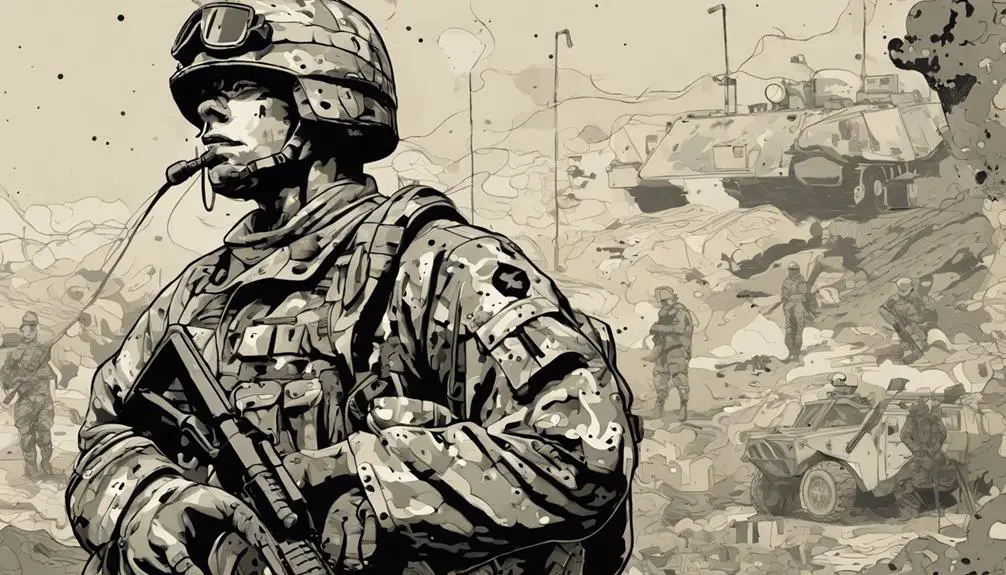You're about to discover the fascinating world of CF military slang, where 'squaddie' means fellow soldier, 'ruck' means backpack, and 'chow' means food. This unique lingo originated from Canadian soldiers adopting British military slang during World War I, and has since evolved with influences from military operations. From essential slang for new recruits to code words for comms security, CF military slang is characterized by colloquialisms and acronyms. As you explore this language, you'll uncover more about the rich warrior culture and identity it represents – and there's much more to uncover.
Origins of CF Military Lingo
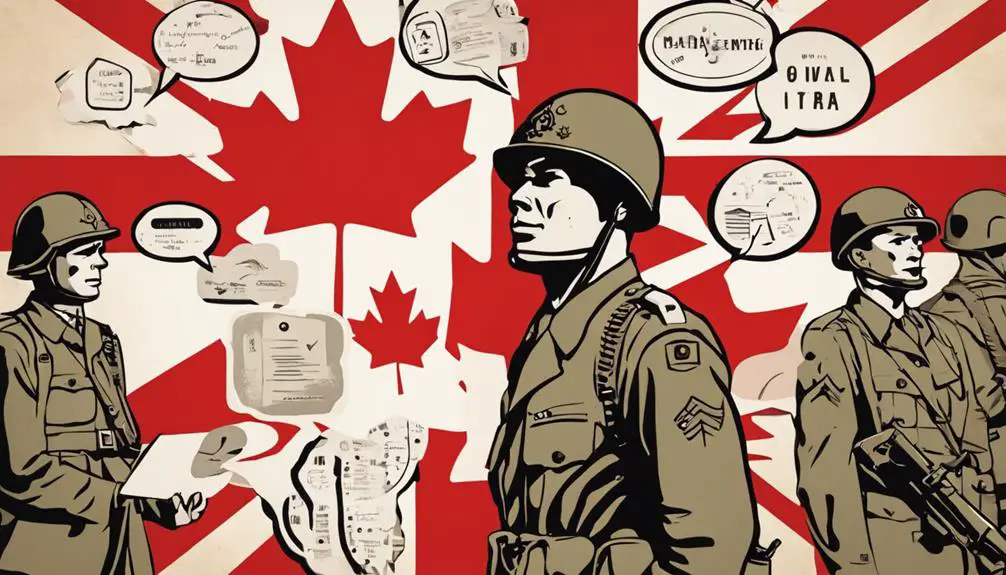
As you explore the world of Canadian Forces (CF) military slang, you'll find that its origins can be traced back to the early 20th century, when Canadian soldiers first adopted British military slang during World War I. This period marked the beginning of a unique linguistic legacy, shaped by the country's warrior culture. The language of war, born out of necessity and camaraderie, became an integral part of Canadian military identity.
During World War I, Canadian soldiers fighting alongside British troops adopted British slang, which eventually blended with their own dialect. This fusion of languages gave birth to a distinct CF military lingo, characterized by colloquialisms, abbreviations, and acronyms. As the CF evolved, so did its language, absorbing influences from various military operations and cultural exchanges.
Today, CF military slang continues to thrive, reflecting the country's rich warrior culture and language legacy. It's a reflection of the adaptability and resilience of Canadian soldiers, who've shaped a unique linguistic identity that resonates throughout the military community.
Essential Slang for New Recruits
As you step into the Canadian Forces, familiarizing yourself with essential military slang is crucial to communicating effectively with your comrades and understanding the military culture.
You'll quickly learn that 'rookie' refers to new recruits like yourself, and 'Rookie Routines' encompass the daily tasks and drills you'll perform during Boot Camp Basics.
'Squaddie' is a term of endearment for your fellow soldiers, while 'garrison' refers to the military base where you're stationed.
When you're 'on detail,' you're assigned to a specific task or duty. Don't be 'lost in the sauce' – stay informed and focused.
In the CF, 'chow' means food, and 'ruck' refers to your backpack. Familiarize yourself with these essential terms to avoid confusion and build strong relationships with your comrades.
Code Words for Comms Security
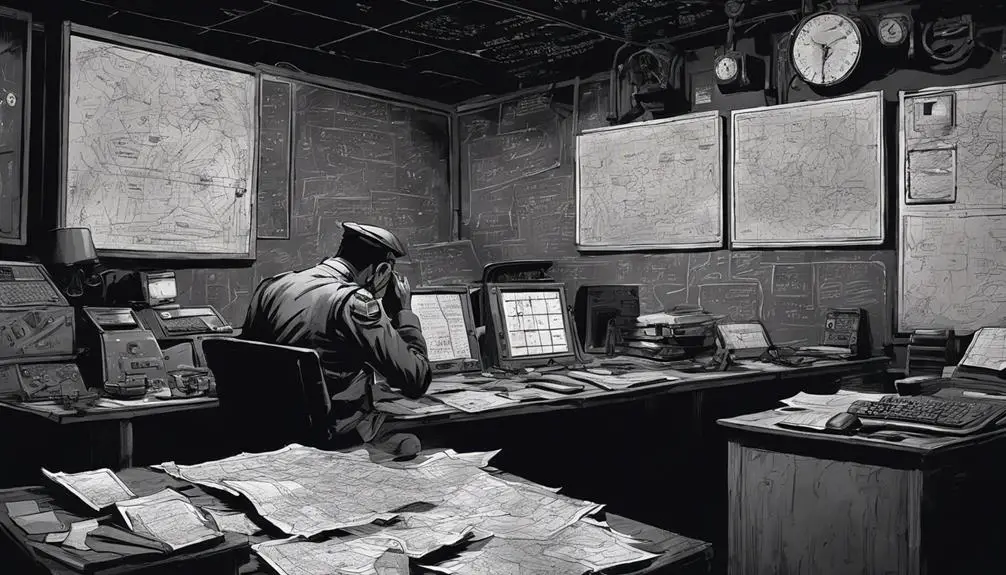
You'll use code words to protect sensitive information during communications, especially when discussing operational details over unsecured channels. This is important to prevent unauthorized access to classified information. In the military, code words are an essential tool for secure communication.
You'll be assigned Crypto Keys, which are used to encrypt and decrypt messages. These keys are regularly updated to maintain the highest level of security.
When communicating over radio or phone, you'll use code words to convey sensitive information. This is known as Secure Chatter. For example, instead of saying 'meet at the old warehouse,' you might say 'meet at the designated location.' This way, even if the communication is intercepted, the information remains protected.
Remember, code words aren't just for secrecy; they're a crucial part of operational security. Always use them when discussing sensitive information over unsecured channels.
Vehicle Nicknames in the CF
In addition to secure communication protocols, military personnel also rely on a unique language to identify vehicles, with nicknames often reflecting a vehicle's purpose, appearance, or quirks.
You'll hear terms like 'War Pig' for the Leopard 2 tank, thanks to its ruggedness and powerful firepower. The 'Chinook' helicopter earns its nickname from its distinctive tandem rotor design, reminiscent of a Chinook salmon's shape.
These vehicle nicknames are an essential part of the military's linguistic arsenal, facilitating quick and accurate communication in high-pressure situations.
In the CF, you might overhear 'Tank Tales' about the 'Leopard's' impressive armor or engage in 'Chopper Chat' about the 'Huey's' versatility. These colloquialisms serve as a shorthand, allowing personnel to convey complex information efficiently.
Slang for Field Operations
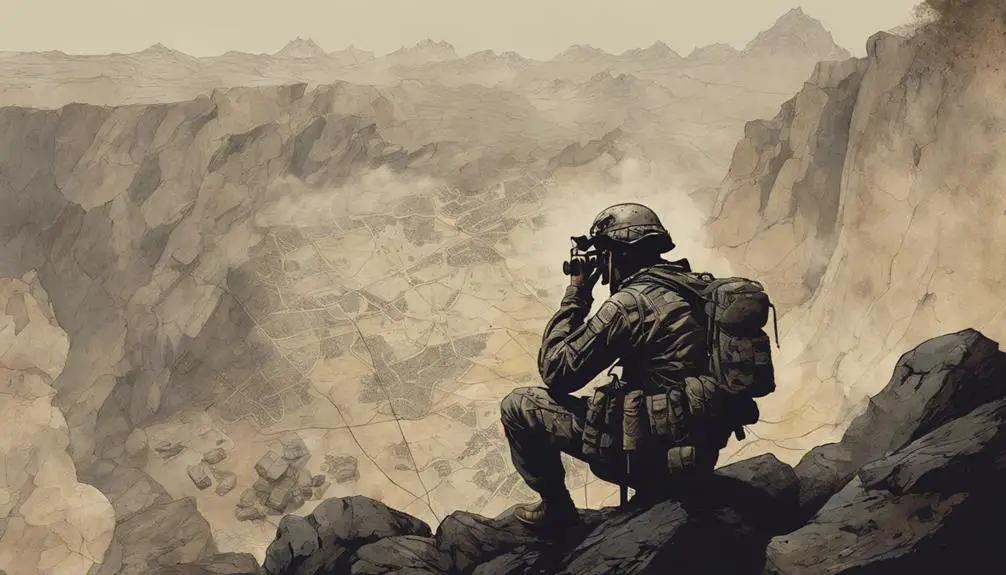
Military personnel rely on a vital set of slang terms to navigate the complexities of field operations, where clear and concise communication is essential. When you're in the field, every second counts, and using the right terminology can make all the difference.
That's where RTO Lingo comes in – a specialized language used by radio telephone operators to quickly convey critical information. You'll often hear phrases like 'over' to indicate the end of a transmission or 'out' to signal the end of a conversation.
OpSec Terms are also essential in field operations, as they safeguard sensitive information remains classified. You'll need to understand phrases like 'need-to-know' and ' Eyes Only' to maintain operational security.
Morale-Boosting Lingo and Jokes
As you shift gears from the high-stakes world of field operations, you'll find that morale-boosting lingo and jokes serve as a crucial release valve, helping to diffuse tension and foster camaraderie among troops.
These Mood Boosters can be as simple as a well-timed pun or a humorous nickname for a fellow soldier. In the Canadian Forces, you'll often hear phrases like 'Roger that' or 'Oscar Mike' to acknowledge orders or signal readiness.
Funny Formations, like a 'Gucci' (good) or 'FUBAR' (fouled up beyond all recognition), add a touch of humor to an otherwise high-pressure environment. These lighthearted expressions help to break the ice, creating a sense of unity and shared experience among soldiers.
Evolution of CF Military Slang
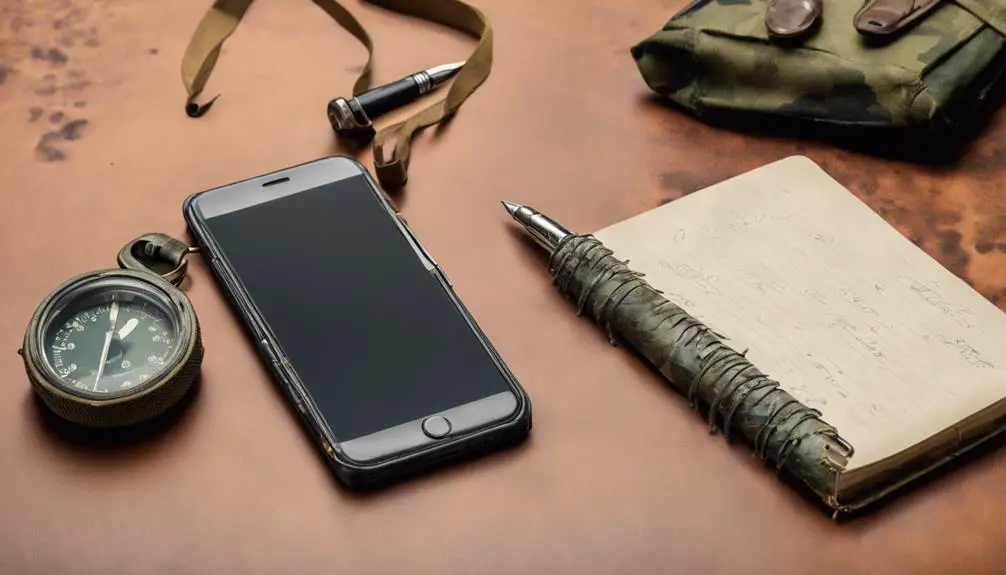
Your exploration of CF military slang expands as you discover its evolution, revealing a complex tapestry of borrowed phrases, adapted acronyms, and homegrown expressions.
As you delve deeper, you'll find that military slang has undergone significant changes over the years, influenced by cultural, social, and technological advancements.
Slang historians attribute the linguistic evolution to the dynamic nature of military operations, where communication needs to be swift, concise, and adaptable.
The integration of new technologies, for instance, has led to the creation of novel expressions, such as 'digital DNA' and 'cyber warriors.'
Additionally, the increasing diversity of military personnel has introduced regional dialects and idioms, enriching the lexicon of military slang.
This linguistic evolution showcases the adaptability and creativity of military personnel.
As you continue to explore the world of CF military slang, you'll uncover a rich cultural heritage that reflects the ever-changing nature of military operations and the people who serve.
Frequently Asked Questions
Is CF Military Slang Used by All Branches of the Canadian Military?
You might wonder if all branches of the Canadian military use a specific slang. The answer lies in the nuances of each branch.
While there's no single slang used universally, you'll find branch differences and uniform variations that reflect distinct cultures.
The Royal Canadian Navy, Canadian Army, and Royal Canadian Air Force each have their own lingo, shaped by unique histories and traditions.
As you explore, you'll discover that each branch has its own distinct voice.
Are There Any Specific Rules for Creating CF Slang Terms?
As you navigate the labyrinth of language, you'll find that creating slang terms is an art form, where words are the brushstrokes on the canvas of communication.
When it comes to forming new terms, there are no hard and fast rules, but rather an organic Slang Evolution. Term Formation often stems from colloquialisms, acronyms, or playful twists on existing words.
You'll find that the most effective slang terms emerge from a blend of creativity, cultural relevance, and a dash of humor.
Can CF Military Slang Be Used in Formal Military Communications?
When communicating in formal military settings, you should avoid using informal language, including CF military slang. Formal exclusions are in place to guarantee clarity and professionalism.
Using CF slang in formal communications can create communication barriers, leading to misunderstandings and misinterpretations. Stick to standardized terminology to maintain clarity and respect for the formal nature of military communications.
Are CF Slang Terms Used by Military Personnel in Other Countries?
You're probably wondering if military personnel in other countries use slang terms like their American counterparts. The answer is a resounding yes! It's like trying to find a needle in a haystack – they're everywhere!
Australian terminology, like 'fair dinkum' (meaning 'genuine' or 'true'), is commonly used, while British colloquialism, such as 'squaddie' for a soldier, is also prevalent.
It's clear that military slang is a universal language, transcending national borders.
Is CF Military Slang Officially Recognized by the Canadian Military?
You might wonder if the Canadian military officially recognizes 'cf' as part of their military slang. The answer is yes.
'Cf' is included in the Canadian Armed Forces' Official Lexicon, showcasing its cultural significance within the military community.
This recognition highlights the term's widespread use and importance in Canadian military communication.
Conclusion
As you've navigated the world of CF military slang, you've likely gained a deeper understanding of the camaraderie and nuances that define this unique culture.
Like a well-oiled machine, CF slang has evolved to facilitate communication, build morale, and create a sense of belonging.
As you continue to serve, remember that this lingo is a living, breathing entity – adapt, adopt, and pass it on to forge an unbreakable bond with your fellow comrades.

